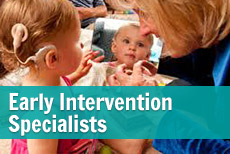Newborn Hearing Screening
The Missouri Newborn Hearing Screening Program strives to assure all newborns are screened for hearing loss by 1 month of age, all newborns who fail the hearing screening are evaluated by an audiologist by 3 months of age, and all infants diagnosed with a permanent hearing loss are enrolled in a program of early intervention by 6 months of age. The purpose of Missouri’s Newborn Hearing Screening Program is to screen babies for hearing loss by 1 month of age, schedule testing to identify hearing loss by 3 months of age, and enroll the child and family in an early intervention program by 6 months of age. These goals are known as the 1-3-6 Plan.
To achieve optimal language outcomes, regardless of mode of communication, follow the 1-3-6 Plan.




By 1 Month
- Obtain a newborn hearing screening in the hospital or by your pediatrician.
By 3 Months
- Obtain a diagnostic hearing evaluation from an audiologist if your child failed the newborn hearing screening.
- Obtain a referral to the Missouri First Steps early intervention program immediately upon diagnosis of hearing loss.
- Obtain an Ear, Nose, & Throat (ENT) physician evaluation.
- Obtain an assessment for amplification (hearing aid) within one month of diagnosis.
By 6 Months
- Begin early intervention services.
What is Missouri First Steps?
Missouri First Steps is an early intervention program that provides services to families with children, birth to three years of age, with disabilities or developmental delays. First Steps is designed to meet the needs of families to enhance their child's development, learning, and participation in family and community life.
Missouri First Steps Contact Information
To refer an infant to the Missouri First Steps program, call (866) 583-2392 or use this link.
What is Family Partnership?
Family Partnership employs Family Partners, who are parents of individuals with special health care needs, including parents of children who are deaf, hard of hearing, and deaf/hard of hearing (D/HH) Plus. Family Partners for Deaf and Hard of Hearing provide peer-to-peer support for families and have firsthand experience navigating options and solutions focused on the unique needs of children and youth who are D/HH and D/HH Plus, from birth to age 21. This support is offered to families at no cost. Learn more about the Family Partnership program by viewing this short video.
Family Partnership Contact Information
Interested in being connected with a Family Partner? Visit the Family Partnership map and select your county to locate the contact information for the Family Partners for Deaf and Hard of Hearing. Additional information can be found by visiting the Family Partnership Program webpage.
What is MOHear?
The MOHear Project is a collaboration between the Missouri Department of Health and Senior Services’ (DHSS) Missouri Newborn Hearing Screening Program (MNHSP) and Missouri State University. MOHears are audiologists, speech-language pathologists, or educators of the deaf or hard-of-hearing who can provide unbiased information to families with an infant newly diagnosed with hearing loss. MOHears help parents understand their baby’s diagnosis and early intervention options. A parent may be connected to a MOHear through their audiologist, their First Steps intake coordinator, or the DHSS Family Partnership’s D/HH Family Partner for families with children who are deaf or hard-of-hearing. Visit the MOHear Map to locate a MOHear in your area. General inquiries about MOHear can be sent to Kris Grbac at krisgrbac@missouristate.edu
What is known
Children with any degree of hearing loss, involving one or both ears, need early intervention and services by six months of age to develop language, social skills and academic levels comparable to their peers with typical hearing. This is true regardless of the type of hearing loss (conductive, sensorineural, mixed or auditory neuropathy), and the communication mode chosen (e.g. sign language, listening and spoken language or some combination of the two). Early access to specialized interventions and services results in improved outcomes for children with hearing loss.




